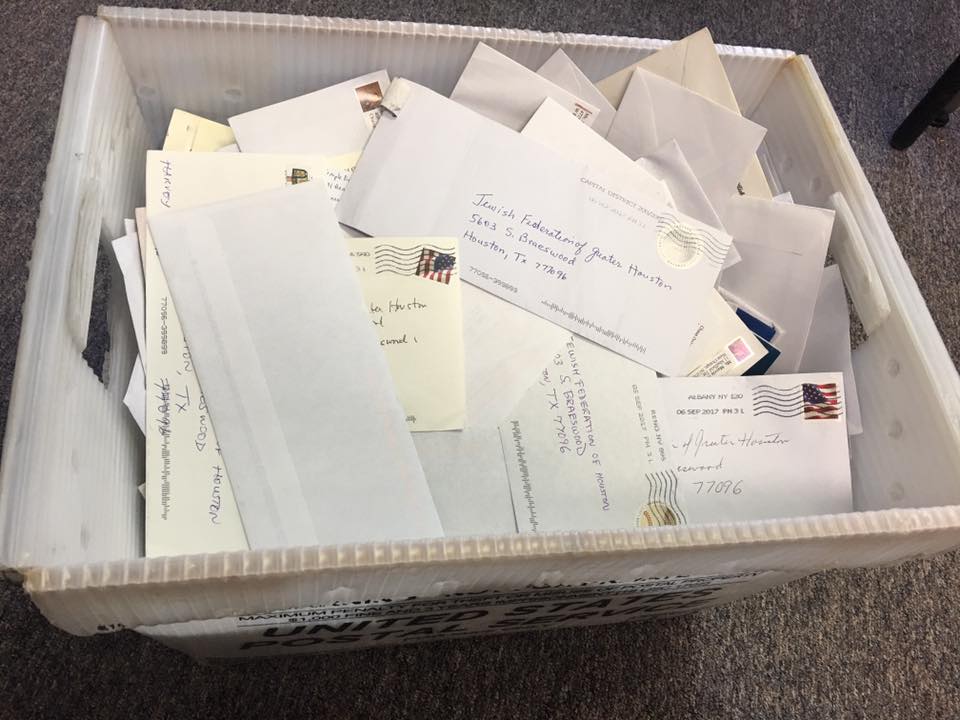
Saturday night in Houston, Texas. As we ushered out the Shabbat and recited the havdallah prayer, I pulled back the shades and peered out onto our cul-de-sac. Harvery’s relentless flood-rains had begun in earnest – soon, the waters would march right up to the very threshold of our home, stopping just short of the doorway. Inside, my children and grandchildren slept peacefully and out of harm’s way, a blessing that I did not take for granted.
And yet, though my own family had escaped the worst, my mind was not at ease – with forty years of experience working for the Jewish community, I was restless at the knowledge that so many would not emerge similarly unscathed. Houston has born the brunt of more than a few storms – but by every accounting, this would be worse. What was to come for this city? For the Jewish community? For its thousands of families, for its many storied and sacred institutions? How would we possibly meet this challenge?
When the flood waters finally receded, my Federation colleagues and I did the only thing that we could do: we got to work. The extent of the destruction soon came into startling focus: more than 2,500 homes (including Federation staff homes), three synagogues, the Jewish Community Center, Seven Acres Jewish Senior Care Service, TORCH Outreach Center, the Beth Yeshurun Day School and more – all with significant damage. Overwhelmed, our staff converged on our offices at the Jewish Federation of Houston. We were unsure of precisely how we would meet the impossibly complicated challenge of providing for the sudden and mounting needs of this community, but we were determined to help. In addition, members of our staff were dealing with severe flooding in their homes.
Here’s the truth that we learned quickly: we couldn’t possibly do it alone. But here’s the other truth that we learned just as quickly: we didn’t have to. Almost at once, we bore witness to a veritable deluge of support. Donations streamed in from across the city, across the country, and across the world. Many national organizations reached out to help; individuals simply showed up in town, ready to get to work. Local listserves were formed so that volunteers could sign up to help out however they could – to clean houses, do laundry, provide transportation, babysit.
Perhaps the most significant support that came our way was from the Jewish Federations of North America. In support of Harvey relief, we collectively raised $14,000,000 from our own community, Federations throughout the United States and Canada, national foundations and thousands of individual donors (as well as $1,000,000 from the State of Israel). We quite simply could not have done this without our national system, which helped spearhead that effort and provide access to various foundations.
Further, JFNA deployed nine incredible staff members from JFNA, UJA-Federation of New York, the Kansas City Federation and more to assist us in organizing, planning and dealing with the tremendous work that needed to be done. With their help, our staff learned how to process more donations in three weeks than we normally do in three years! They helped us to stay “nimble” and get the first $1.6 million dollars out the door within 10 days, a much faster rate than what we were used to.
For several years now, I have heard a similar refrain echoing in the Jewish organizational blogger-sphere: the “collective” is dead. Federations specifically, the argument goes, are obsolete. They don’t speak to the individualistic proclivities of this generation. Young community members and philanthropists want to pick and choose the causes that speak specifically to them.
I understand that perspective, I really do. In fact, I think it’s critically important for Federations and other long-established institutions to be nimble enough to shift in order to resonate with a younger generation. As a member of the “old school,” I’ve made a concerted effort to step out of my comfort zone and have seen the advantages of this innovative approach, and the way it activates some of our young people in incredible ways.
But I refuse to believe that these two models are mutually exclusive. No matter how “tailor-made” the experience of Jewish philanthropy becomes, the importance of fostering a strong sense of collective identity will forever remain a hallmark of the Jewish people, and our first line of defense in moments of need.
It’s those moments that the unity of the Jewish people is put on glorious display, from the Soviet Jewry movement, to the Aliyah from Ethiopia; from wars and Intifadas in Israel, to our very own Houston community welcoming 5000 members of the New Orleans Jewish community who arrived in Houston in the aftermath of Katrina. I am sure there will be more moments to come, more hurdles to jump, more needs to be met.
This is a fractious world that we live in. That which divides us has never been more pronounced. This is true on a global scale, and it’s unfortunately true within the Jewish community as well. And that’s why it’s critically important to be even more persistent in our pursuit of common ground, and to come together at these critical moments. For it is in these moments that we remember we are am echad, b’lev echad. One People. One Heart. One strong, beautiful collective.
Suzanne Jacobson is Senior Vice President of Development at the Jewish Federation of Greater Houston.

0Comments
Add CommentPlease login to leave a comment